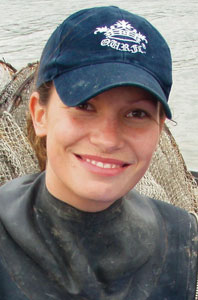THE WILD salmon lobby today accused fish farmers and the Government of holding a sword of Damocles over the head of one of Scotland’s most iconic natural resources.
In the latest of a series of increasingly belligerent attacks on the multi-million pound aquaculture industry, game fishery campaigners claim they have amassed ground-breaking scientific evidence of “a devastating catalogue of malpractice” in the way salmon farming is adversely impacting migratory fish and the marine environment.
In its report into scientific studies on the environmental impact of fish farming, the Salmon & Trout Association (S&TA), the UK’s leading game fish conservation charity, calls for a nine-point “survival plan” to be implemented immediately.
Paul Knight, S&TA chief executive, said: “Aquaculture practised sustainably can offer enormous benefits to mankind and significantly reduce pressure on our precious wild oceanic stocks.
“But the scientific literature unequivocally demonstrates that fish farms, as presently constructed and operated, are having a disastrous impact on native fisheries, the wider environment and the many public benefits associated with it.”
The report, 2010: Year Zero for Wild Scottish Salmon? and its findings were pointedly dismissed by the Scottish Salmon Producers’ Organisation, the leading trade body, as a “rehash of ill-informed information from 20 years ago.”
Dr John Webster, technical director of the SSPO, a fish biologist and himself a lifelong angler, said:
Unfortunately the S&TA is stepping into areas that it has no understanding of whatsoever. There seems to be a perception that if you remove fish-farming entirely from the equation, everything will be fine. Things have changed since the days when you could catch 12 fish before breakfast.”
He said there was nothing in the report that the industry had not heard before.
Today’s report is backed by Fish Legal, the ASFB and RAFTS. It comes just days after a Scottish Government announcement of new proposals to help streamline the planning process for more fish farms which the £367million-a-year industry wants to see expand at 3.5% a year for the next five years.
It also follows hard on the heels of the escape into Loch Lochy, one of Scotland’s most pressurised wild salmon catchments, of thousands of juvenile fish from a Marine Harvest farm.

S&TA head of science, Janina Gray said today:
The evidence is clear that aquaculture can have a significantly negative impact, in some areas, on wild salmon, sea trout and their environment. We must . . . take action before it’s too late”
The S&TA pledges to do “everything possible” to ensure the survival of wild game fish and calls on the Scottish Government and farming industry to respond to the challenge urgently.
Its nine-point plan proposes:
- Universal use of enclosed systems for fish rearing
- Adherence to the EU’s Precautionary Principle on habitat protection
- Development of an effective sea lice dispersal model
- Creation of a list of ecologically and economically sensitive sites
- A ban on new farm sites in these areas
- An experimental relocation of a marine salmon farm away from wild fish migration routes
- Environmental impact assessments for all new fish farm applications
- Smolt farms outlawed from any active salmonid river
- Mandatory stocking of sterile farm fish
The war of words exposes the weaknesses of industry/environmental working groups and looks certain to create unwanted political tensions for the Holyrood Government as it moves towards an election next year since it pits wealthy and influential game fishing interests against commercial salmon farming. Both sides support thousands of rural jobs.
It will also test rural affairs minister Richard Lochhead’s attempts to walk the delicate tightrope between being seen as both a protector of the environment and a facilitator of marine and aquaculture exploitation.
A Scottish Government spokesman said tonight:
“We are currently considering the document produced by the Salmon & Trout Association and will respond in due course once we have had time to assess their detailed report and discuss it with Marine Scotland.
“The Scottish Government is committed to a thriving aquaculture industry, where both farmed fish and wild fishing interests can develop in a responsible and sustainable manner. We have already created a new group to improve fish health and disease control and our Renewed Strategic Framework for Scottish Aquaculture is already making strides forward in a spirit of cooperation.”
Related stories:
Marine Harvest pledges co-operation . . .

One Responses
[…] increasingly belligerent war against the multi-million pound aquaculture industry. This spring in a report entitled 2010: Year Zero for Wild Scottish Salmon? it claimed to have amassed scientific evidence […]